Search:
Powered by
Website Baker
Sterling Price’s 1864 Missouri Cavalry Raid |
| Posted by The Muse (themuse) on Sep 12 2014 |
It’s the summer of 1864 and events are not going well for the Confederate States of America. In June, Lieutenant General Ulysses S. Grant and the Army of the Potomac has General Robert E. Lee under siege at Petersburg, Virginia. Towards the end of July, Major General William T. Sherman and the Army of the Tennessee has Lieutenant General John Bell Hood under siege at Atlanta, Georgia.
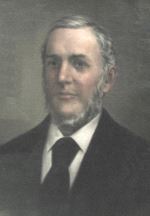 Thomas C. Reynolds was the Governor of Missouri in the eyes of the Confederacy. Exiled in Marshall, Texas, Reynolds was keen to invade and take back Missouri for the Confederacy. On July 18, 1864, Reynolds wrote a long letter to Sterling Price. [i]
Thomas C. Reynolds was the Governor of Missouri in the eyes of the Confederacy. Exiled in Marshall, Texas, Reynolds was keen to invade and take back Missouri for the Confederacy. On July 18, 1864, Reynolds wrote a long letter to Sterling Price. [i]Our affairs in the eastern half of our Confederacy are in critical condition … The President and Secretary of War are impatient for an advance into Missouri … If successful in maintaining itself the cavalry might be re-enforced by infantry from Arkansas and by recruiting within our State. But the main point of view from which I suggest such an expedition is, that it may take off some of the pressure on us in Virginia and Georgia.
Four days later Price sent his reply to Reynolds. [ii]
I consider such an expedition practicable, and in the contingency you suggest desirable and important … I would like to take command of the expedition … My opinion is that the people of Missouri are ready for a general uprising, and that the time was never more propitious for an advance of our forces into Missouri. Our friends should be encouraged and supported promptly. Delay will be dangerous.
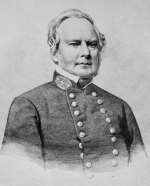 Sterling Price believed there were 30,000 recruits waiting in Missouri and lobbied Kirby Smith to order a cavalry raid into Missouri. [iii]
Sterling Price believed there were 30,000 recruits waiting in Missouri and lobbied Kirby Smith to order a cavalry raid into Missouri. [iii]The accumulating testimony of the state of affairs in Missouri … show that the Federals have but few reliable forces in the State, their garrisons being manned almost entirely with their State militia, in whose loyalty they have but little confidence … I am also assured that the Confederate flag floats over nearly all the principal towns of North Missouri, and large guerrilla parties are formed and operating in the southern portion of the State … I respectfully but urgently suggest the propriety of making a move into the State.
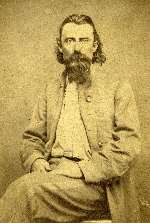 In the years before the start of the American Civil War, Jo Shelby, living in Waverly, was one of the richest men in Missouri. Now a Brigadier General in the Confederate army, Jo Shelby was eager to launch a raid into Missouri. [iv]
In the years before the start of the American Civil War, Jo Shelby, living in Waverly, was one of the richest men in Missouri. Now a Brigadier General in the Confederate army, Jo Shelby was eager to launch a raid into Missouri. [iv]My chief intention in writing this communication is to [offer] a few arguments in favor of making a raid to Missouri … There is no regularly organized Federal force in the State and the militia are scattered, broken up, and worse than useless … [Missourians] … are terribly in earnest; it is death or victory, and with a little encouragement and help 20,000 men would spring to arms … The entire department is stripped of regulars for Grant and Sherman … I can march north with 5,000 men … without costing the Government a dollar … I can bring out 5,000 recruits, clothe them, and light a fire of opposition that never can be quenched.
On July 29, 1864, General 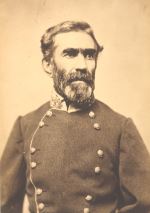 sent a dispatch to Lieutenant-General Kirby Smith, commander of the Confederacy's Trans-Mississippi Department. Bragg's purpose was to make Smith understand that the survival of the Confederacy depended on Smith moving his forces east of the Mississippi River. [v]
sent a dispatch to Lieutenant-General Kirby Smith, commander of the Confederacy's Trans-Mississippi Department. Bragg's purpose was to make Smith understand that the survival of the Confederacy depended on Smith moving his forces east of the Mississippi River. [v]
 sent a dispatch to Lieutenant-General Kirby Smith, commander of the Confederacy's Trans-Mississippi Department. Bragg's purpose was to make Smith understand that the survival of the Confederacy depended on Smith moving his forces east of the Mississippi River. [v]
sent a dispatch to Lieutenant-General Kirby Smith, commander of the Confederacy's Trans-Mississippi Department. Bragg's purpose was to make Smith understand that the survival of the Confederacy depended on Smith moving his forces east of the Mississippi River. [v][There is a] pressing necessity for the movement of your troops across the Mississippi River. At Petersburg General Lee has a formidable army in his front … General Hood's army has retired to the immediate vicinity of Atlanta, and Sherman is threatening that place with an army superior in numbers … Every available man in General Hood's department has been sent to the front … Still more troops are urgently needed.
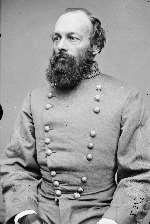 Kirby Smith’s problem was the Mississippi River was controlled by the Union. He had no way to get troops across the river to reinforce Hood. So he did the next best thing. By ordering Price to invade Missouri, Smith hoped the Union would have to divert Sherman’s reinforcements into Missouri to fend off Price. On August 4, 1864, Kirby Smith ordered Sterling Price to launch the invasion into Missouri. [vi]
Kirby Smith’s problem was the Mississippi River was controlled by the Union. He had no way to get troops across the river to reinforce Hood. So he did the next best thing. By ordering Price to invade Missouri, Smith hoped the Union would have to divert Sherman’s reinforcements into Missouri to fend off Price. On August 4, 1864, Kirby Smith ordered Sterling Price to launch the invasion into Missouri. [vi]You will make immediate arrangements for a movement into Missouri, with the entire cavalry force of your district … Rally the loyal men of Missouri, and remember that our great want is men, and that your object should be, if you cannot maintain yourself in that country, to bring as large an accession as possible to our force … Make Saint Louis the objective point of your movement, which, if rapidly made, will put you in possession of that place, its supplies, and military stores … Should you be compelled to withdraw from the State, make your retreat through Kansas and the Indian Territory, sweeping that country of its mules, horses, cattle, and military supplies of all kinds.
[i] OR Series 1, Volume 41, Part 2, 1011-1012.
[ii] OR Series 1, Volume 41, Part 2, 1020.
[iii] OR Series 1, Volume 41, Part 2, 1023-1024.
[iv] OR Series 1, Volume 41, Part 2, 1027.
[v] OR Series 1, Volume 41, Part 2, 1029-1030.
[vi] OR Series 1, Volume 41, Part 2, 1040-1041.
Last changed: Sep 12 2014 at 2:57 PM
Back